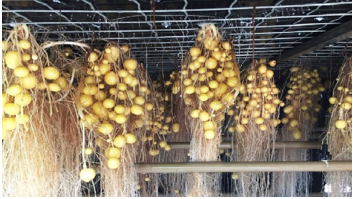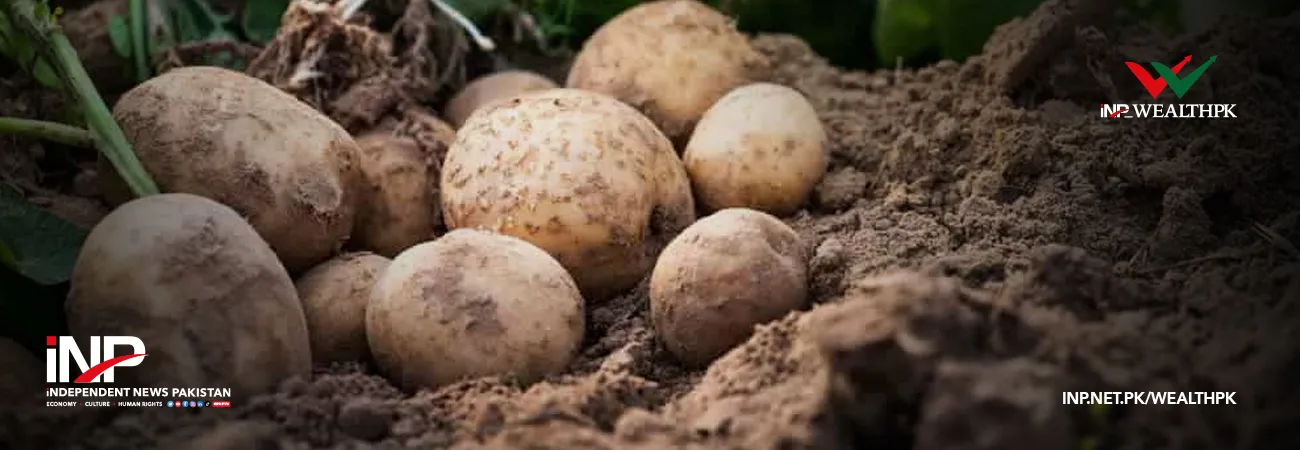INP-WealthPk
Azeem Ahmed Khan
Pakistan aims to cut its dependence on imported potato seeds by producing 160,000 tons of virus-free certified seeds annually through aeroponic technology by 2027, under a South Korean-backed project.
The initiative, a five-year collaboration with the Korea Partnership for Innovation of Agriculture (KOPIA), was launched in 2023 with the ambitious goal of meeting about 30% of Pakistan's total potato seed demand upon its conclusion in 2027, KOPIA Project Coordinator Dr Aish Muhammad told Wealth Pakistan.

However, the 30% self-sufficiency target has been reduced to 20% as the potato producing area has now increased compared to 2023, he explained.
The project has already made significant progress. According to Dr Aish, 110 tons of certified seed potatoes have been distributed to 42 farmers and seed companies. Substantial infrastructure has been established, including aeroponic greenhouses, screenhouses covering 28,000 square meters, and a 400-ton cold storage facility to preserve seed quality. The project has also focused on capacity building, training 400 individuals, including 30 inspectors of Federal Seed Certification and Registration Department, with 17 receiving advanced training in South Korea, he added.
The Pakistan government has recognised the long-term potential of the project and requested Korea International Cooperation Agency (KOICA) approve a follow-up project to continue scaling up production beyond 2027, Dr Aish said. “This proposal is currently under review, with a decision expected by December this year.” Currently, 1-2% of the country’s annual demand for about 950,000 tons of seed potatoes is met through expensive imports worth Rs2 to Rs3 billion, he said, underscoring the project's significance for Pakistan's food security.
While the aeroponic greenhouses can produce 450,000 tubers annually and seed potatoes, imports have not yet been reduced due to the project's relatively small scale, but in five years, imports will start to fall as production increases. "The elimination of potato seed imports will be a step towards self-reliance in local potato seed production," he said, noting that the lack of good quality seeds has historically posed a major challenge to crop production.
The project’s sustainable approach involves a multi-stage production cycle. It begins with developing disease-free potato plants in tissue culture labs. These are then transferred to aeroponic greenhouses and multiplied in screenhouses before being distributed to registered farmers and seed companies. “These farmers, in turn, are required to multiply the seed over four generations, ensuring a sustainable and widespread supply,” Dr Aish said. Farmers’ interest in the certified seeds has been exceptionally high, with demand exceeding the current supply, Dr Aish said.
Emphasising the transparency of the seed’s distribution process, he said the process involves public advertisements and allocations based on applications. The shift to aeroponic technology offers dramatic improvements in yield and quality. Dr Aish explained that while conventional methods yield about five tuber seeds per plant, an aeroponically grown plant can produce 40 to 50 tuber seeds.
“This high efficiency, combined with the technology’s ability to grow thousands of virus-free plants annually, directly addresses a key issue hindering potato production in Pakistan: virus attacks,” he said. Another major benefit is the conservation of water and power, critical for a country facing resource scarcity. “This makes aeroponic farming a particularly sustainable and efficient solution for Pakistan's agricultural needs,” Dr Aish said.
Despite cultivating potatoes on some 340,000 hectares, Pakistan's production is hampered by a reliance on low-quality domestic seeds. While 15,000 to 20,000 tonnes of seeds are imported each year, the nation's total requirement of approximately 950,000 tonnes remains largely unmet by high-quality seeds, as many farmers cannot afford them. This situation contributes to the country's low potato output.
The collaboration with KOPIA is part of a broader effort to increase crop production, reduce post-harvest losses, and increase farm revenue, particularly for small landholders. By strengthening its domestic seed supply, Pakistan can improve food security and reduce its reliance on costly imports, a strategic move towards building a more resilient agricultural sector, Dr Aish said.
Credit: INP-WealthPk









